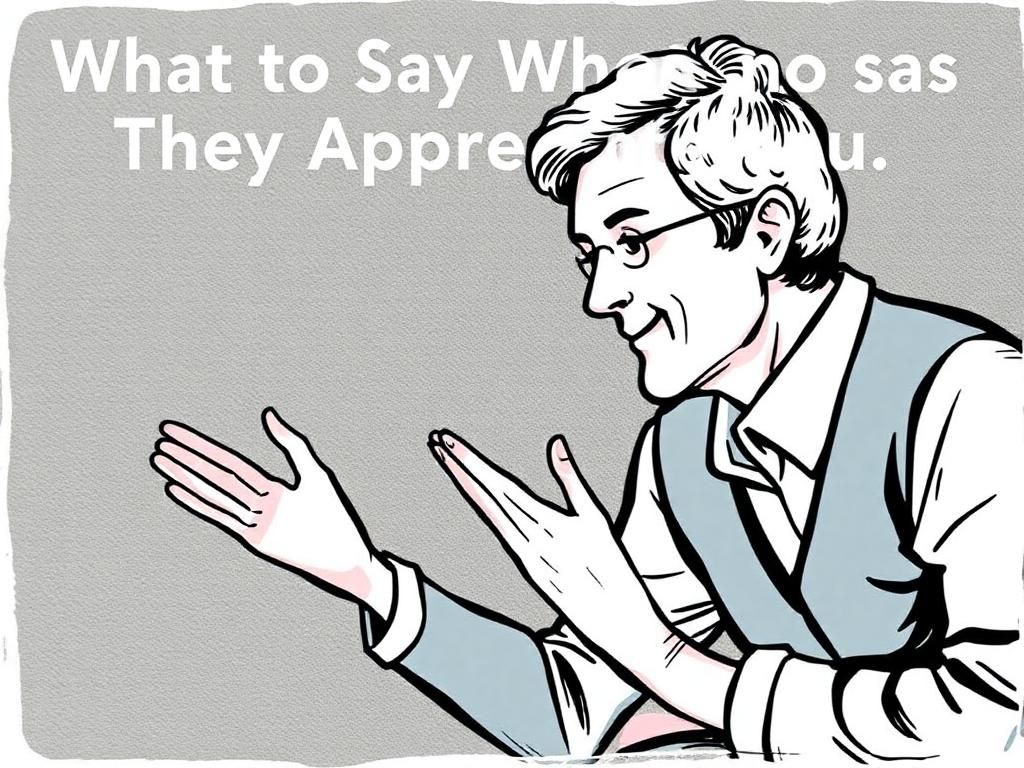Receiving appreciation from others is a heartwarming experience that can strengthen bonds and foster positive relationships. When someone expresses their gratitude, knowing what to say when someone says they appreciate you can enhance the moment and make it more meaningful. Acknowledging appreciation is not just about polite responses; it’s about building connections and fostering a supportive atmosphere around us. In this article, we will explore the various contexts of appreciation, how to respond graciously, and the importance of humility and cultural sensitivity.
Understanding the Context of Appreciation
Different Scenarios of Appreciation
Understanding the context in which appreciation is expressed is crucial. Here are some common scenarios:
- Personal relationships: Friends and family frequently express gratitude in everyday exchanges. Simple acknowledgments can bolster these connections.
- Professional settings: Colleagues or supervisors may show appreciation for hard work or collaboration. Recognizing such gratitude can improve workplace morale.
- Casual encounters: Even service workers or acquaintances may express appreciation. Responding positively to them can enhance interactions and show you value their efforts.
The Impact of Genuine Gratitude
Expressing genuine gratitude has powerful effects:
- Strengthening bonds: When you reciprocate appreciation, it builds deeper connections.
- Encouraging positive behavior: Gratitude has a way of promoting kindness. By responding with warmth, you encourage a cycle of appreciation.
Responding to Appreciation Graciously
Basic Acknowledgment
Sometimes, a simple response is all that’s needed when someone says they appreciate you. Basic acknowledgment can effectively validate their feelings:
- “Thank you!”: A classic response that shows you value their appreciation.
- “I appreciate you too!”: Reflecting back their sentiment can strengthen the relationship.
Elaborating on the Appreciation
For deeper connections, elaborate on your feelings:
- “Your support means a lot to me as well.”: This not only acknowledges their gratitude but also shares your feelings.
- “I value our relationship too.”: Reinforcing the bond can lead to richer conversations.
Reflecting on a Specific Instance
Highlighting a specific moment makes your response more personal:
- “I remember when you helped me with…; that really made a difference.”: This shows that you cherish their support and remember shared experiences.
When to Be Humble
Avoiding Overconfidence
While responding to appreciation, it’s essential to maintain a humble demeanor. Overconfidence can create distance rather than connection:
- The importance of modesty: Acknowledging your contribution without boasting fosters humility.
- Balancing self-worth with humility: Recognize your value while appreciating others’ contributions.

Examples of Humble Responses
Here are some humble responses that convey appreciation without arrogance:
- “I was just doing what I could.”: This indicates your willingness to help while downplaying your role.
- “It was my pleasure; I’m glad I could help.”: Expressing satisfaction in helping others goes a long way.
Building on the Appreciation
Encouraging Further Conversation
Use appreciation as a stepping stone for deeper interactions:
- Asking open-ended questions: Questions like “What made you feel that way?” can lead to engaging discussions.
- “Is there anything else I can do to support you?”: This not only shows your willingness to help but may also strengthen the bond.
Reinforcing Positive Interactions
Share experiences to build rapport:
- “I enjoyed working together on that project; let’s plan more collaborations.”: Such statements encourage future interactions.
- “Let’s grab coffee soon; I’d love to catch up!”: This shows your desire to nurture the relationship.
Cultural Considerations in Responding to Appreciation
Varied Responses Across Cultures
Gratitude can be expressed and perceived differently across cultures. Here are some considerations:
- Examples of cultural differences: In some cultures, expressing gratitude may be more formal, while in others, it may be casual.
- Importance of being culturally sensitive: Understanding these nuances can help avoid misunderstandings.
Adapting Responses
Adjust your tone and formality based on cultural context:
- In formal cultures, consider using formal titles and approaches.
- In informal settings, connections may be strengthened through casual interactions.
Conclusion
Restating the Importance of Gratitude
Appreciating others brings numerous benefits:
- The benefits of appreciating others: It creates positivity and fosters a supportive environment.
- Making appreciation a regular practice: Incorporate it into your daily routines to enhance relationships.
Encouragement to Embrace Appreciation
Embrace the power of appreciation by:
- Reciprocity in relationships: Regular expressions of gratitude enrich connections.
- Personal call to action: Commit to show appreciation and respond graciously to those around you.
| Scenario | Typical Responses | Considerations |
|---|---|---|
| Personal Relationships | “Thank you! Your support means a lot.” | Contextualize based on closeness. |
| Professional Settings | “I appreciate your guidance.” | Maintain professionalism. |
| Casual Encounters | “Thanks! I really appreciate your help.” | Be approachable and warm. |
Frequently Asked Questions
1. What is the best response when someone says they appreciate you?
A sincere “Thank you” can suffice, or you can reflect their appreciation reciprocally.
2. How can I show that I appreciate someone?
Expressing gratitude verbally and committing to supportive actions demonstrates appreciation.
3. Why is it important to acknowledge appreciation?
Acknowledging appreciation strengthens bonds and creates a supportive atmosphere.
4. Should my response vary depending on the situation?
Yes, tailor your responses based on the context, such as personal or professional settings.
5. How do cultural differences affect my response?
Cultural norms dictate how gratitude is expressed, so be sensitive to these variances.
6. Can written expressions of gratitude be effective?
Absolutely. A handwritten note or email can convey lasting appreciation.
7. What if I’m uncomfortable with compliments?
Practice accepting appreciation gracefully; it’s a skill that can be developed over time.
8. How does expressing gratitude benefit relationships?
It fosters stronger bonds, encourages positivity, and creates an uplifting environment.
9. Can gratitude be shown in non-verbal ways?
Yes, body language, gestures, and acts of kindness also express gratitude effectively.
10. How can I make gratitude a daily practice?
Incorporate simple thank-you notes or acknowledgments into your routine to nurture connections.


